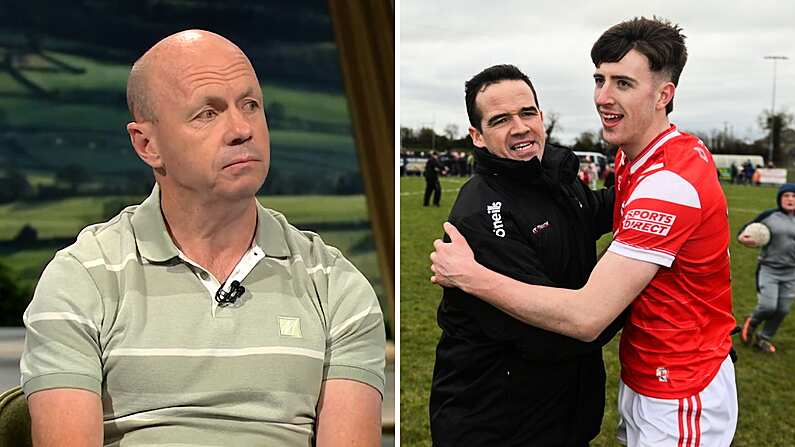The race for the 2015 Formula One drivers championship drew to a close on Sunday.
Sunday's American Grand Prix, at which Lewis Hamilton made certain of his third world title, attracted little interest in Ireland, save for a vine of Nico Rosberg petulantly throwing his cap at the victor afterwards.
Interested in Formula One in this country collapsed the year the Jordans disappeared into the history books and RTE decided to stop sending Peter Collins to races.
Getting up in the middle of the night to watch the Australian grand prix
After the event was moved from Adelaide to Melbourne, the Australian Grand Prix switched from being the final race in the calender to the first.
This being the first race of the season, there was always an added enthusiasm.
There had been no Formula One on television for about six months so one had forgotten that it was essentially a boring sport. Youngsters frequently set their alarm so as to wake up at 4.00am in time for the first race of the season.
Not bothering to watch later races even when they were on in the middle of the day
All had changed by mid summer. By that stage, disillusioned by 'team orders' and endless dull races, many decided against watching races even if they were scheduled for the middle of the day.
Michael Schumacher's last day shenanigans
Schumacher inhabited the Manchester United role in Formula One, being simultaneously the most heavily supported driver (among glory hunting kids) and the most despised.
Schumacher was frequently the subject of tutting articles from the UK press, disgusted by the manner his triumph over Damon Hill in the 1994 Formula One championship.
Leading the championship by a point and leading the race, Schumacher veered into a wall on the 35th lap.
Having damaged his own car, Schumacher survived to trundle his way back to track in the lead. He forced a collision between himself and Damon Hill, ending his own involvement in the race but also, crucially, damaging Hill's car beyond repair. As both drivers failed to finish, Schumacher won the championship by a point. Crucially, he left enough ambiguity about whether he meant to collide with Hill that he wasn't penalised.
Three years later, he tried the same trick on Jacques Villeneuve, but Villeneuve, though his car was damaged, managed to survive and finish the race.
How did the Jordan's go?
As Paul Kimmage wrote recently, 'How did the Jordan's go?' was part of the Irish sporting lexicon during the 1990s. It's hard to credit these days but there was great joy when Jordan claimed their first race win back in Spa-Francorchamps in Belgium in 1998.
Their peak year came in 1999, when they finished third in the constructors championship and Heinz Harold Frentzen had an outside shot of the drivers championship with three races remaining.
Team orders
The phenomenon that blighted Formula One in the late 90s and early 2000s. Poor old Ruebens Barrichello busting a gut to lead a race the whole way and then being forced to make way for the number 1. just before the finish line.
The rich lads who run Formula One should have anticipated the outrage but then these guys have never been much concerned with optics.
The team orders phenomenon is most associated with that period in the early 2000s, when Michael Schumacher held the drivers championship in a vice grip.
Frank Williams - the James Bond supporting character who never was
It's a wonder that the James Bond writers have yet to make one of their primary adversaries the runner of a Formula One team.
Thanks to his continental foreigness, Jean Todt, the French head of Ferrari, would make a particularly suitable villain.
Sir Frank Williams, on the other hand, could play any character in a James Bond film, save for Bond himself. He would make a good villain, but also an ideal elder statesman within the British secret service.
Murrayisms
Naturally, we never listened to Murray Walker because we were listening to Peter Collins and David Kennedy on the other side.
Murray inherited the mantle of David Coleman, becoming famed for committing harmless gaffes during his commentary.
Favourites include the time he informed viewers that a particular Formula One track was filled with 'inclines' which 'not only go up but go down as well'.
The casual observer and the one race track he always remembered
Monte Carlo best emphasised what the sport of Formula One was all about.
Disgustingly rich men and their financially dependant but outstandingly attractive other halves enjoying the sound of screeching cars in a 'country' where the income tax rate sits at a most congenial 0%.
It was far from Monte Carlo that most people were reared, and that even includes Formula One drivers. Asked to instance a Formula One track, the casual follower would likely instance Monaco.
Read more: Ireland's First Ever Rugby World Cup Anthem Was Even Worse Than Ireland's Call...









